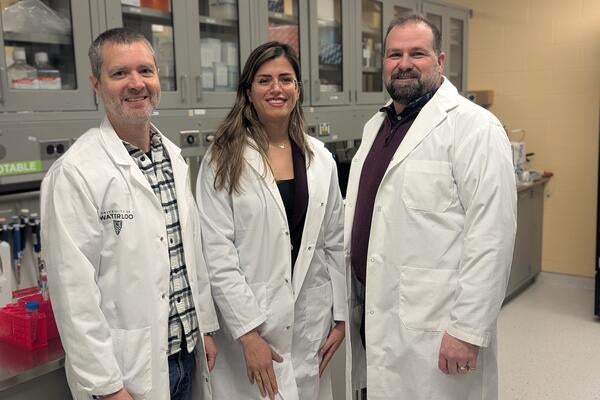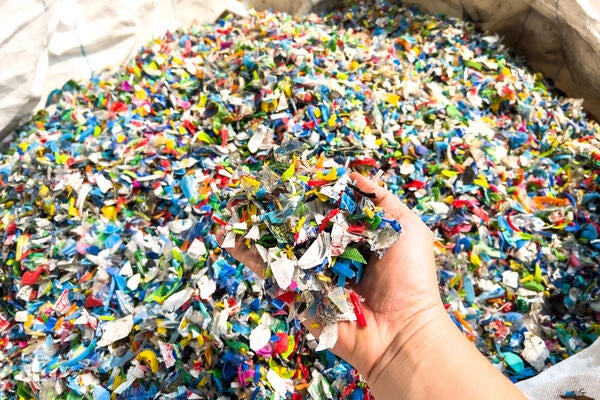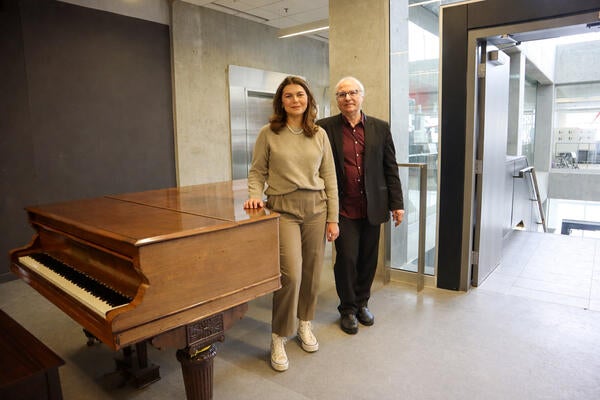
RoboHub: Rise of the Robot Teams
Farfetched ideas that were once just found in Isaac Asimov novels will now come to life in the Faculty of Engineering’s revolutionary RoboHub advanced robotics testing facility

Farfetched ideas that were once just found in Isaac Asimov novels will now come to life in the Faculty of Engineering’s revolutionary RoboHub advanced robotics testing facility
By Angela Pause Faculty of Engineering“Nowhere else on the planet will you find the same advanced robotics technology under one roof. It will place Canada at the forefront of this strategically important emerging field. ”
Prof. William Melek, Director of Mechatronics Engineering
They call it Engineering 7, which, in typical University of Waterloo engineering style, is an elegant solution to naming a building that is set to begin construction this fall. Despite the simple name, inside this building some astoundingly complex things will happen. Farfetched ideas that were once just found in Isaac Asimov novels will now come to life in the Faculty of Engineering’s revolutionary RoboHub advanced robotics testing facility. It will be a state-of-the art showcase for humanoid, aerial, ground and maglev robot technologies, and the first of its kind in the world.

At the RoboHub, Waterloo Engineering researchers will develop diverse robot teams and simulate complex, real-world environments, as they crack open new multidisciplinary avenues to explore the potential of these combined advanced robotic technologies, says Prof. William Melek, a mechanical and mechatronics engineering professor who heads the RoboHub team.
Unlike the humanoid robots mimicking Japanese hostesses or other single-system robots that have recently captured the attention of consumers, Waterloo Engineering’s RoboHub will focus on robot teams that remain immune to individual failure. These co-ordinated advanced robotics teams have a vast range of potential applications: monitoring oil pipelines; tracking forest fires; maintaining hazardous high-voltage lines; mapping minefields; surveying agricultural land; unobtrusively studying wildlife behaviour, says Melek. All things Canada has in abundance but spread out over vast geographical and often incredibly harsh conditions that make it dangerous or economically unfeasible for humans.
This unique robotic testing facility, is critical to advancing the prosperity of Canada, says Melek. In agreement is the Canada Foundation for Innovation (CFI) which recently awarded Melek $1.5 million in support of the research. The global robotics market is expected to be over $200 billion by 2025, and is one of the top six disruptive technologies for the coming decade, according to McKinsey Global Institute.
 Waterloo Region is already home to a dynamic cluster of high-profile robotics companies, including Clearpath Robotics and Aeryon Labs, both founded by Waterloo Engineering alumni. The RoboHub research will provide the key breakthroughs to grow this burgeoning Canadian industry, says Melek. Some of the formidable challenges facing his team is perfecting human-robot interactions as well as developing algorithms to optimize robot team behavior and creating advanced perception systems to navigate changing environments, a key to autonomous vehicles.
Waterloo Region is already home to a dynamic cluster of high-profile robotics companies, including Clearpath Robotics and Aeryon Labs, both founded by Waterloo Engineering alumni. The RoboHub research will provide the key breakthroughs to grow this burgeoning Canadian industry, says Melek. Some of the formidable challenges facing his team is perfecting human-robot interactions as well as developing algorithms to optimize robot team behavior and creating advanced perception systems to navigate changing environments, a key to autonomous vehicles.
The RoboHub research team at Waterloo Engineering is heavily stacked with expertise – most of the researchers are pioneers in the fields of microrobotics, autonomous robotics, multi-agent networks, magnetic levitation, nonlinear control systems, artificial intelligence and human-robot interaction, says Melek, and they intend to work closely with manufacturers, who will then be able to deploy RoboHub-developed automation technology to boost productivity and quality. The RoboHub team will also collaborate with eight Canadian universities, 10 industrial partners and four government partners to help propel Canada to the forefront of the highly competitive global robotics industry.

Read more
Researchers engineer bacteria capable of consuming tumours from the inside out

Hand holding small pieces of cut colourful plastic bottles, which Waterloo researchers are now able to convert into high-value products using sunlight. (RecycleMan/Getty Images)
Read more
Sunlight-powered process converts plastic waste into a valuable chemical without added emissions

University of Waterloo researchers Olga Ibragimova (left) and Dr. Chrystopher Nehaniv found that symmetry is the key to composing great melodies. (Amanda Brown/University of Waterloo)
Read more
University of Waterloo researchers uncover the hidden mathematical equations in musical melodies
Read
Engineering stories
Visit
Waterloo Engineering home
Contact
Waterloo Engineering
The University of Waterloo acknowledges that much of our work takes place on the traditional territory of the Neutral, Anishinaabeg, and Haudenosaunee peoples. Our main campus is situated on the Haldimand Tract, the land granted to the Six Nations that includes six miles on each side of the Grand River. Our active work toward reconciliation takes place across our campuses through research, learning, teaching, and community building, and is co-ordinated within the Office of Indigenous Relations.